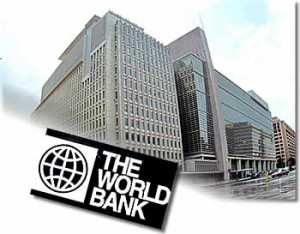World Bank: Turkey may get hurt by a likely repeat of 2008 global crisis
 Growing storm clouds over the eurozone mean that developing economies are vulnerable to a possible repeat of the 2008 global crisis, the World Bank says in a report revealed yesterday. The bank especially warns Turkey due to its large current account deficit, high short-term debt and low foreign currency reserves
Growing storm clouds over the eurozone mean that developing economies are vulnerable to a possible repeat of the 2008 global crisis, the World Bank says in a report revealed yesterday. The bank especially warns Turkey due to its large current account deficit, high short-term debt and low foreign currency reserves
The World Bank warned developing countries, including Turkey, to prepare for the “real” risk that an escalation in the euro area debt crisis could tip the world into more turmoil.
In the report released yesterday, the Washington-based World Bank sharply cut its world economic growth forecasts, Reuters reported, adding that Europe was probably already in recession. Global economic growth is now forecast to be at 2.5 percent this year and 3.1 percent in 2013, well below the 3.6 percent growth for each year projected in June.
Slow growth forecast
The report included particularly worrying information for Turkey, whose large current account deficit and relatively high external debt poses a threat as the Turkish Lira remains under pressure. The World Bank cut its gross domestic product (GDP) growth forecast for Turkey to 2.9 percent this year, from a June 2011 estimate of 5.1 percent. The forecast for 2013 GDP growth was revised down to 4.2 percent, from 5.3 percent.
“Risks are particularly acute for countries like Turkey that combine large current account deficits, high short-term debt ratios and low reserves,” the World Bank said. “Indeed, Turkey‘s current account gap in 2011 is estimated to be six times larger than its net foreign direct investment [FDI] flows in 2011, and its short-term debt represents 80 percent of its reserves.” The report noted that these foreign exchange reserves have been falling in recent months.
According to the report, Turkey’s external financing need stands at 19 percent of GDP, assuming that the current account gap remains at 9.8 percent of GDP. Countries with such large funding requirements may be vulnerable to a tightening of credit conditions, the World Bank said.
External financing needs for developing countries are defined as the current account deficit, plus scheduled payments on short-term and longer-term debt to private creditors.
If an economic downturn similar to the one in 2008 reoccurs, Turkey could also be impacted as the volume of their exports falls sharply, due to its heavy reliance on manufacturing, the report said. The report also described inflation as “of concern” in several countries, including Turkey.
Shrinkage in eurozone
On the global front, the report forecasted high-income economies to expand just 1.4 percent in 2012 as the euro area shrinks 0.3 percent. The bank cut its forecast for growth in developing economies to 5.4 percent for 2012 from its previous forecast of 6.2 percent, saying expansion in Brazil and India – and to a lesser extent Russia, South Africa and Turkey – had slowed already. China’s growth was forecast at 8.4 percent this year.
“The downturn in Europe and weaker growth in developing countries raises the risk that the two developments reinforce one another, resulting in an even weaker outcome,” Reuters quoted the report as saying.
It also cited failure so far to resolve high debts and deficits in Japan, the U.S. and slow growth in other leading economies, and warned that this could trigger sudden shocks.
19.01.2012
SOURCE: HDN





